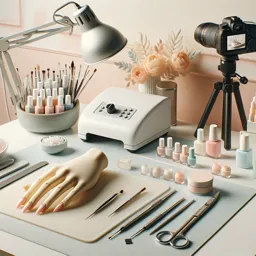Nail extensions have become a popular way to enhance the length and appearance of nails, offering endless possibilities for nail art and design. With several types of nail extensions available, it’s essential to understand the differences between them so you can choose the best option for your needs. In this article, we’ll explain the three most common types of nail extensions: acrylic, gel, and fiberglass.
1. Acrylic Nail Extensions
Acrylic nails are one of the most popular and long-standing options in the world of nail extensions. They are created by combining a liquid monomer with a powdered polymer, forming a paste that is applied to the natural nail and sculpted into the desired shape.
Pros of Acrylic Nail Extensions:
- Durable and Long-Lasting: Acrylic nails are known for their strength and can last up to 3-4 weeks before needing a fill.
- Customizable Length and Shape: You can achieve virtually any length or shape with acrylics, from square to almond to stiletto.
- Good for Nail Art: Acrylic nails provide a solid foundation for intricate nail art designs.
Cons of Acrylic Nail Extensions:
- Strong Odor: The chemicals used in acrylic nails can produce a strong smell during application, which can be unpleasant.
- Damage to Natural Nails: If not removed correctly, acrylic nails can cause damage to your natural nails, leaving them weak or brittle.
- Requires Maintenance: Acrylic nails need regular fills every 2-3 weeks as your natural nails grow out.
2. Gel Nail Extensions
Gel nails have become increasingly popular due to their natural look and flexible feel. Gel extensions are created using a special gel that hardens under UV or LED light, resulting in a glossy, long-lasting finish.
Pros of Gel Nail Extensions:
- Natural Appearance: Gel nails often have a more natural look compared to acrylics, with a smoother and shinier finish.
- Flexible and Lightweight: Gel nails are softer and more flexible than acrylics, making them more comfortable to wear.
- Less Odor: Unlike acrylics, gel nails do not produce a strong chemical odor during application.
Cons of Gel Nail Extensions:
- Less Durable than Acrylics: While gel nails are durable, they are generally not as strong as acrylics and may chip or break more easily.
- UV Exposure: The curing process requires exposure to UV or LED light, which some people may want to avoid due to concerns about UV exposure.
- More Expensive: Gel extensions can be more expensive than acrylics, both in terms of application and removal.
3. Fiberglass Nail Extensions
Fiberglass, or silk, nail extensions are a less common option but can be a great choice for those looking for a natural and lightweight alternative to acrylics and gels. These extensions use fiberglass or silk wraps that are applied to the nails and then hardened with a resin.
Pros of Fiberglass Nail Extensions:
- Natural Look and Feel: Fiberglass nails are thin and lightweight, giving them a very natural appearance.
- Ideal for Nail Repairs: Fiberglass is often used to repair damaged or broken nails, as the material is flexible and gentle on natural nails.
- No Harsh Chemicals: The application process does not involve strong-smelling chemicals, making it a more pleasant experience for those sensitive to odors.
Cons of Fiberglass Nail Extensions:
- Less Durable: Fiberglass extensions are not as strong or long-lasting as acrylic or gel nails, meaning they may need to be replaced more frequently.
- More Delicate: These extensions can break or tear easily, especially if you are rough on your nails.
- Less Common: Because fiberglass extensions are less popular, it can be harder to find salons that offer this service.
Which Type is Right for You?
Choosing the best type of nail extension depends on your lifestyle, preferences, and the look you want to achieve. If you need long-lasting durability and don’t mind regular maintenance, acrylic nails are a great option. If you prefer a more natural, flexible feel, gel nails may be better suited for you. For those seeking a lightweight and natural alternative, fiberglass nails are an excellent choice, especially for nail repairs.
Conclusion
Understanding the differences between acrylic, gel, and fiberglass nail extensions will help you make an informed decision about which type is right for you. Each has its own unique benefits and drawbacks, so consider your preferences and lifestyle before choosing the perfect nail extension to enhance your look.





















